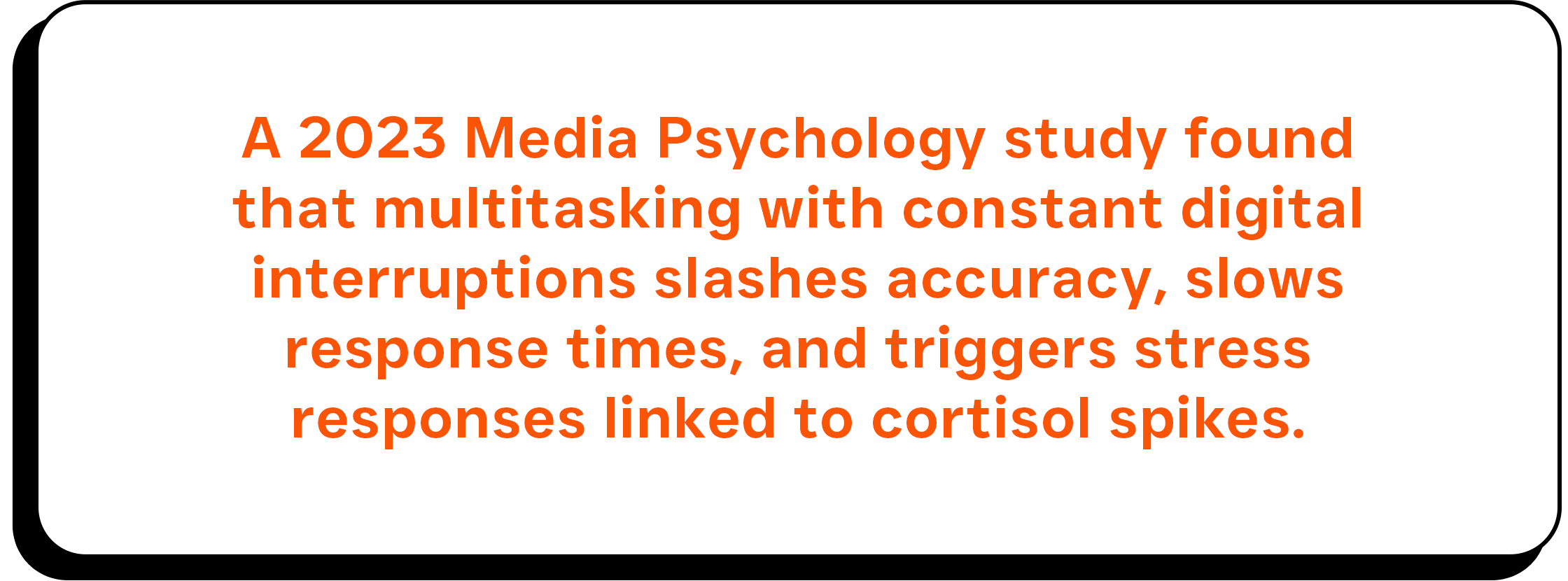What If You’re Not Addicted -Just Overwhelmed?
Maybe you’re not addicted to your phone. Maybe you’re just… drowning.
It’s not that you “can’t” stop scrolling.
It’s that you’ve got Slack pings, 47 unread WhatsApps, three calendar alerts, and a notification from an app you swear you’ve never installed.
Your brain’s not broken. It’s overloaded.
The Myth of “Addiction”
We throw around the word “addiction” like it’s the only explanation for why we can’t look away.
But research shows that for many of us, it’s not about compulsion -it’s about capacity.
Your nervous system can only handle so many “incoming” signals before it tips into stress mode. When you’re hit with constant micro-interruptions, your attention becomes like a computer with too many tabs open: slower, glitchier, and more likely to crash.
When your brain is bombarded by constant pings and dings, it switches into a state of continuous partial attention, where it’s never fully on one thing but always scanning for the next. This doesn’t just feel exhausting -it is exhausting.
A study published in Media Psychology (2023) tested older and younger adults under multitasking conditions in a simulated environment with concurrent digital media streams. Compared to single-task conditions, dual-tasking led to reduced accuracy, slower response times, and noticeable biological stress reactions - including elevated heart rate and skin conductance, both proxies for cortisol response.
Source: Media Psychology
This Isn’t a Detox Problem - It’s a Design Problem
You don’t need to quit your phone. You need to quit the overwhelm.
Phones, apps, and platforms are engineered to demand your attention. As Tristan Harris, co-founder of the Center for Humane Technology, puts it:“It’s not a fair fight between human willpower and the technology that’s designed to capture it.”
So stop trying to fight it bare-handed.
Change the way you interact with your tech -with habits that protect your focus, instead of draining it.
When you start to see your phone less as a guilty pleasure and more as an environment designed to compete for your mind, it shifts the way you respond. You stop blaming yourself -and start building boundaries.
How to Stop Drowning (Without Moving to a Cabin in the Woods)
LiVELY’s whole approach is about meeting you where you are -busy, human, sometimes messy -and giving you micro-habits that make a macro difference:
Triage your notifications -Turn off non-essential alerts. Your attention isn’t public property.
Build a “landing pad” -A set place and time to deal with messages instead of reacting all day.
One-tab rule -Keep only one app or browser tab open when working on something important.
Buffer zones -Add a 5–10 min pause before you check your phone in the morning or after work.
The Big Shift
You’re not weak.
You’re just living in an environment that asks for your attention more times in a day than your grandparents’ generation heard their own names in a week.
And the good news?
With the right strategies, you can create breathing room without cutting yourself off from the world.
Maybe you’re not addicted. Maybe you’re just overwhelmed. And maybe that’s something you can change -one small habit at a time.



